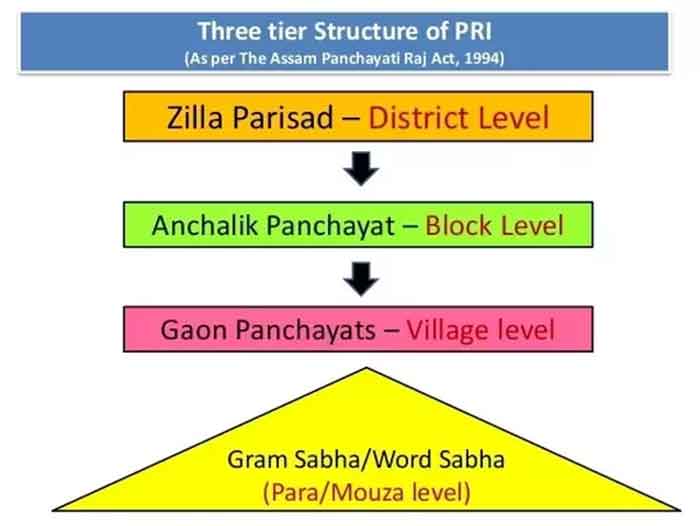
India has established an elaborate three-tier system of decentralisation known as Panchayati Raj. This is in tune with the three tier administrative system of village panchayat, block and district level. However some changes in this system have been overdue. Before making some important suggestions this writer will like to clarify that no retrenchment or loss of job ( or even any reduction of salary for any post ) is involved in this, only a re-assigning of certain responsiblities.
First and foremost, it is proposed that panchayats are strengthened with much more resources, rights and scope of work and at the same time involvement of people, particularly weaker sections and women, role of gram sabhas, system of checks and balances and social audits are strengthened. In addition judicial aspect of panchayats or nyaya panchayats should be added or strengthened so that most local disputes can be settled within the panchayat. Not only will panchayats get more resources and will have effective role in more responsibilities, in addition people at all levels, particularly women and weaker sections will be involved in this. Panchayats leaders who fail to honor such involvement, with checks and balances, can be recalled and removed. Panchayats will be much more free in using resources according to their own priorities and needs. Panchayat secretary post will be abolished and panchayts will recruit local educated persons for help in administrative work. Different responsibilities will be assigned to panchayat secretry for statistical, survey and monitoring work.
Secondly, panchayats will be linked directly to districts and the existing second tier of blocks will be abolished. At the time of panchayat elections, apart from electing panchayat members, people will vote directly for electing a district representative as well as a district chairperson. Hence all elections in panchayati raj will be direct elections. Similarly at administrative level block posts will be abolished. However no one will lose job and they can stay where they are with different responsibility for survey, statistical and monitoring work, special assignments and for helping panchayats when their help is sought.
Many police functions at local level will be given to panchayats and community organizations.There will be only one police station in a district at the district headquarters in one district with actual police rights. All the other police officials at different places can stay where they are but they will have different responsibilities of security including those related to protection from disasters, as assigned by district police authorities, including special squads for fighting powerful mafias or criminal gangs. The panchayats and local town authorities will ask the district police station for special help when needed, otherwise routine law and order will be managed at community and decentralized level.
While no one will be sacked , as a new system emerges, some jobs can be phased out and more can be created at panchayat level. The net impact under these reforms will be to create many more jobs at village level closer to home. In particular we envisage ‘nasha virodhi aur mahila sashaktikaran’ ( women’s empowerment and anti-alcohol, anti-intoxicant) groups in all panchayats, with all members getting modest honorarium as well, paid by the government.
The three tiers in this system mean village, district and state, with block abolished. More autonomy for states will be emphasized. Greater decentralizaton will come with systems in place for protecting national unity and integrity. Most basic precepts of protecting women, weaker sections and vulnerable groups, communal harmony and socio-economic justice will have to be honored at all levels.
Bharat Dogra is a journalist and author. His recent books include Planet in Peril and Man Over Machine.
Related posts:
Related posts:
Views: 0
 RSS Feed
RSS Feed

















 September 22nd, 2021
September 22nd, 2021  Awake Goy
Awake Goy  Posted in
Posted in  Tags:
Tags: 
















